Hoffman’s Vision Nearly Two Decades Ago Saving Jewish Lives Around Country
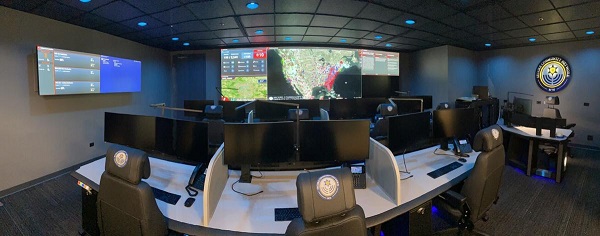
Secure Community Network’s duty desk was established in December 2017 in Chicago and has been a key part of SCN’s intelligence gathering and sharing apparatus. Photo / SCN
JANE KAUFMAN | STAFF REPORTER
Article reprinted with permission from Cleveland Jewish News
Days before Stephen H. Hoffman was due in Jerusalem for the 2003 General Assembly of United Jewish Communities, truck bombs detonated in front of two synagogues in Istanbul, Turkey.
In a post-9/11 world, Hoffman was already concerned. He feared there might be a day when Middle East terrorism could make its way to North America.
This spurred a conversation at King David Hotel in Jerusalem with Malcolm Hoenlein, executive vice chairman of the Council of Presidents of Major Jewish Organizations.
“He and I talked about the security picture in the United States, which was basically nonexistent,” Hoffman told the Cleveland Jewish News Jan. 26. “I think the guard at the desk might have been armed at Cleveland for a long time and that the New York federation that you went through a magnetometer.”
The two discussed the need for a central security network that would be capable of sharing information with the FBI and the U.S. Department of Homeland Security. The network, as the two envisioned it, would both inform and help safeguard the Jewish community across the continent and establish relationships with local law enforcement agencies.
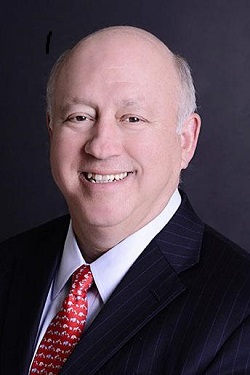
Hoffman
Hoffman, who was the president of the Jewish Federation of Cleveland and was “on loan” to lead the national Jewish federation system in New York City, said he believed the federation system would be a good platform to build the network.
There had previously been some troubling incidents, including a threat made in the Virginia Beach, Va., area. The FBI told communal leaders locally about it. Even without sophisticated social media at the time, there ensued widespread panic among Jews across the country.
“Events were canceled,” Hoffman recalled. “Extra security guards were hired across the country. And the threat didn’t pan out. But people panicked. The FBI insisted that it did the right thing by only talking to the local community.”
Hoffman did not agree.
“There was no mechanism to discuss this at the national level and provide guidance to the Jewish community across the United States,” he said.
Hoenlein and Hoffman consulted with David Harris, CEO of American Jewish Committee (who will step down from AJC in May after 31 years), and the three approached the administration of President George W. Bush about sharing communication to a national Jewish security agency.
“We were able to arrange a meeting with the director of the FBI, who said, ‘I share your concerns. But the way we work is all through local operations,’” Hoffman said.
He said they persisted.
At a second meeting with the director of the FBI, a deputy director of the FBI was appointed liaison to the Jewish community.
Hoffman’s vision of the new central security network, Secure Community Network, started in 2004 with a budget of $500,000 a year.
“Operationally, I ran it out of JFNA,” he said. “We ran the books. We did the hiring.”
Just last month, SCN was suddenly thrust into the spotlight based on the words of Congregation Beth Israel’s Rabbi Charlie Cytron-Walker who credited training he received through SCN for his ability to respond effectively during a hostage crisis, throwing a chair to distract the gunman and allowing the three hostages to escape. The Colleyville, Texas rabbi was one of 17,000 people who had gone through SCN trainings in 2021.
In the beginning
Paul Goldenberg was hired as the first CEO of SCN, shaping it into the first faith-based homeland security information sharing initiative in the country.
“Getting people to pay attention to … security was a real challenge,” Hoffman said.
He said he spoke at the next General Assembly about the concept. The reaction, he said, “was like, what are you talking about? Or we have it covered.”
Since there was no sense of urgency, there was also not a lot of interest in giving to the cause.
“We struggled to get the money year after year,” Hoffman said.

Rudin-Luria
Hoffman credited fellow Clevelander Michael D. Siegal, now chair of The Jewish Agency for Israel, who assumed leadership of Jewish Federations of North America in the lay position of chairman, as a more able fundraiser for SCN in its fledgling years.
When Hoffman returned to Cleveland in 2004 to resume the presidency of the Jewish Federation of Cleveland, he turned his attention to security locally and statewide, hiring Jim Hartnett, an FBI veteran as director of community-wide security at the Federation.
“Jim, together with Oren Baratz (senior vice president of external affairs at the Federation) took the SCN concept and built the blueprint for how a local community security team fits into the equation,” Erika B. Rudin-Luria, who succeeded Hoffman as president of the Jewish Federation of Cleveland when he retired Dec. 31, 2018, and was named president emeritus, told the CJN Feb. 4. “Jim and Oren work collaboratively with other community security teams and the leadership of SCN.”
SCN taking shape
Raising the profile of SCN in 2013, Goldenberg was appointed to the U.S. Department of Homeland Security Advisory Council.
In 2017, Michael G. Masters was named CEO of SCN under Harold Gernsbacher, who remains chair of SCN today. Gernsbacher is also treasurer of JFNA, highlighting the close ties between the two organizations.
When Masters came aboard in 2017, there were 22 full-time security initiatives at Jewish communities across the country. SCN had assisted federations in recruiting and hiring about 70% of the security directors.
At the time, the relationship with DHS and FBI was strong, Masters told the CJN. There was an intelligence sharing component. Other aspects, such as facilities assessments, also took place, but were limited by SCN’s budget.
Prior to taking his position in 2017, Masters began working with SCN to try to develop a standard set of best practices to secure the Jewish community across the country.
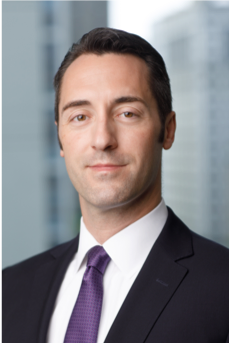
Masters
“And that would mean that the security may look different if you were in Miami versus Memphis, or Portland, Maine versus Portland, Oregon, but that there was a consistency and standardization that the community could be assured was best practice,” Masters told the CJN Jan. 26.
In December 2017, SCN created its intelligence duty desk, which has a 24/7 operation in Chicago where it monitors and shares information about national threats with Jewish communities and law enforcement agencies.
“And they coordinate with security directors and programs across the country,” Masters said, including the Ohio Regional Intelligence Center, which was initiated a little more than a year ago. It is modeled after the Jewish Federation of Greater Los Angeles’ Community Security Initiative. Baratz and Hartnett worked with the Jewish Federation of Cincinnati to create ORIC, which has become a statewide strategic program designed to seek out pertinent security-related information and provide timely and relevant alerts, warnings and notifications to Jewish community leaders throughout Ohio.
SCN’s budget was $1.2 million in December 2017. Today, it is $10.5 million. Part of that growth is in the build-out of the National Jewish Security Operations Command Center, which has a team of intelligence analysts.
Today, SCN oversees security directors for more than half the federations in the country and is in the process of hiring regional directors to cover the entire country to include smaller communities that don’t have dedicated security directors.
What SCN does
In addition to intelligence gathering and sharing, facility assessments, physical security support, training exercises and education, SCN also works with law enforcement and does incident crisis and management.
When Masters took over, he said, “There were examples of incredibly robust,
well-funded, professionally-led and managed community supported initiatives, and of course, perhaps probably the greatest example of that leadership demonstrated from Cleveland – with a comprehensive program that involves information sharing, coordination with law enforcement, training, physical security, applying for grants – all of those things. But you would go to a different community, and even though they might have a professional, they might have a security program, it looked very different.”
In March 2018, Masters said there was a meeting in Cleveland of security directors from across the country.
At that meeting, Masters learned they were conducting assessments of buildings and there was no standard tool used to do so. So, SCN created one. In addition, it has created training tools.
“What we’ve tried to do since 2017 is create a really strong network, ensure that intelligence information is flowing, ensure that there’s consistency in best practice in the standards of physical security of the assessments, of the training and incident response,” Masters said. “And I think that is not only more akin to how law enforcement works, but in the best sense of how our collective Jewish system works.”
Masters said that after the Pittsburgh shootings at the Tree of Life Synagogue on Oct. 27, 2018, which killed 11 people and injured six, virtually every family in Pittsburgh with a child in Jewish day school, sent their child to school the following Monday.
“And of course, we saw that same sense of empowerment (last month) where the rabbi (Cytron-Walker) and Jeff Cohen (a hostage at Congregation Beth Israel) said ‘we knew what to do, because we had this training.’”
On Jan. 15, as a gunman held four hostages, SCN posted a flash report to its partners at 12:48 p.m. EST.
“According to open sources, at around 11:30 CST, police in Colleyville, Texas, responded to an unspecified incident at Congregation Beth Israel of Colleyville,” the flash report opened.
It was sent to SCN staff, SCN leadership, facility and security liaisons, law enforcement stakeholders, community wide security programs, safety liaisons, campus safety programs and national security partner organizations.
Joel Marcovitch, CEO of JewishColumbus, got the alert.
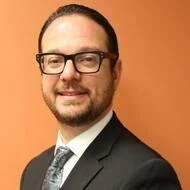
Marcovitch
“Within the space of like, I think, 40 minutes of when the news broke, we had a text message that went out to all of our rabbis, all of the directors, all of the board members and other people who need to be on that text, explaining the situation and for them to say there’s no local threat,” Marcovitch said.
At 2:30 p.m. Jan. 15, SCN convened a call with security directors of Jewish communities across the country to brief them about what was known about the situation at that time. Meanwhile, the security director of the Jewish Federation of Greater Dallas went to Colleyville to respond to the scene.
The mobilization and intelligence sharing continued, Brad Orsini, senior national security adviser of SCN, told the CJN Jan. 26.
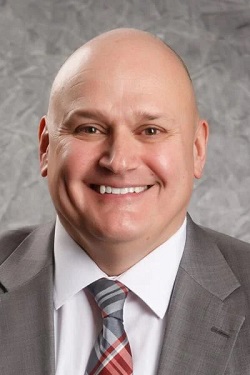
Orsini
“And we were also communicating with the FBI at the highest levels,” Orsini said. “And really, at that point, now it’s a coordination of all our resources across the country, in all our communities – because all the communities are saying, what do we do now? Is this a bigger threat – just like any one of these attacks on the community. And so, we’re sifting through the information, you know, (in) constant communication with the FBI.”
The following day, at 12:30 p.m., SCN convened a national meeting for Jewish leaders, which was also attended by Paul Abbate, deputy director of the FBI, and Homeland Security Secretary Alejandro Mayorkas.
“Everybody was asking, what do we do now?” said Orsini, who had been chief security officer for the Jewish Federation of Greater Pittsburgh prior to working at SCN.
Referring to the April 27, 2019 shooting at Chabad of Poway in California, he said, “What did we learn from this lesson that we might not have learned from Pittsburgh or Poway?”
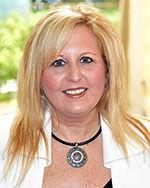
Deutsch Burdman
“During that call, we did a 15-minute segment of, these are the top six things that every synagogue should do right now,” Orsini said. “Nobody died, and no hostages died, which is, thank G-d for that. But now, what do we learn from this? And how do we secure ourselves even more with a potential threat? So … now we’re doing community meetings across the country.”
Spotlight on SCN, Colleyville
SCN offers four core trainings: situational awareness; countering active threat; facility security and Stop The Bleed.
“Truthfully, it’s been a game-changer in how we operate,” Bonnie Deutsch Burdman, executive director, community relations/government affairs of the Youngstown Area Jewish Federation, told the CJN Jan. 28. “The infrastructure for SCN and the ability to be in contact with people you need to be in contact with in real time is so important during a crisis.”
Referring to a July 11, 2019, incident in which the Youngstown Jewish Community Center was tagged in a violent video that was posted on social media, “We had our own little situation with a young man who threatened our JCC,” Deutsch Burdman said. “And working with SCN was very, very important to be able to make sure we had all the appropriate information, our security team was able to liaise with local law enforcement authorities and that was really important as well.”
Reflecting on that incident, she said, “The lesson there was having those connections and having open lines of communication between our federation security team and every local law enforcement entity is crucial.”
Following the Texas hostage crisis, JFNA accelerated the roll-out of its $54 million LiveSecure campaign, aimed at helping further safeguard 146 Jewish communities across the continent.
Hoffman, who now chairs the Jack, Joseph and Morton Mandel Foundation in downtown Cleveland – and who said it was initially a struggle to raise money for security – has in recent years awarded two grants to JFNA for that initiative from the Mandel Foundation, the first of $9 million and a more recent $6 million match.
JFNA CEO Eric Fingerhut, a former Cleveland resident, told the CJN Jan. 26 that SCN’s most important work may never be reported. He credited Hoffman for his “prescient” decision to form SCN.
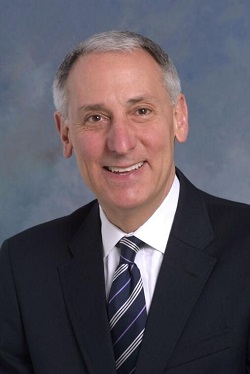
Fingerhut
“It’s certainly grown in its sophistication,” said Fingerhut, thinking back to SCN’s start. “Its ability to track incidents and share the information, its relationships with FBI, Homeland Security, police associations, etc. ... that’s what we needed it to do. … It doesn’t come into the spotlight until there is an incident like Colleyville.
“But I can assure you that the work that SCN does has been a major factor in preventing any number of incidents. Remember, we only make the news from the incidents that happen. We don’t know about all the ones that are prevented. And that’s really the work that’s happening every day.”

![[image]](http://access.jewishcleveland.org/images/ad_cemetery_db.jpg)
![[image]](http://access.jewishcleveland.org/images/ad_new_to_cle.jpg)